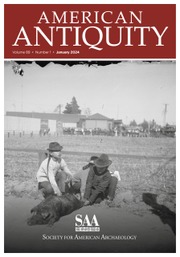Decolonization. Equity. Inclusion. Diversity. Collaboration. Community-based. BIPOC. LGBTQIA2S+. NAGRPA. How do we fold in the ideas behind these inventive and visionary words and acronyms to an archaeology that is currently entrenched in colonial language and practices, inequity, and exclusion? I have heard that this call for decolonizing archaeology is nothing more than the most recent version of being politically correct. To this I say, IT IS NOT being politically correct. IT IS THE FUTURE. We must deal with it, get over the knee-jerk responses, and move on with situating a more progressive and engaged archaeology in the world arena. We must focus on the next generation, and we must create a new future for archaeology and for ourselves that is not entrenched in isms and narrow agendas. It is time to reimagine how we do what we do.
One way to do this is to educate ourselves. There are publications, webinars, podcasts, interviews, panels, symposia, and books on these topics that are coming out at a rapid pace. Many of these are written or sponsored by the likes of the Society of Black Archaeologists, the Indigenous Archaeology Collective, and SAPIENS, as well as other emerging nonprofits such as the Black Trowel Collective and Archaeology in the Community. There are many ideas out there about very specific ways to decolonize archaeology, and these are the voices we need to be listening to. One of the best ways to kick off being knowledgeable about these issues is the webinar series produced by SAPIENS and the aforementioned groups entitled “From Margins to Mainstream: Black and Indigenous Futures in Archaeology.” This nine-part series runs the gamut of topics, including new perspectives on repatriation and human rights, restorative justice, Indigenous and Black storytelling as counterhistory, new definitions of heritage and ecologies through a BIPOC lens, and radically reimagining how knowledge is produced and reproduced. It is excellent.
And, in the recent SAA Archaeological Record, Wilcox and colleagues (Reference Wilcox, Lippert, Montgomery, Zimmerman, Nicholas, McAnany, Conkey, Colwell and McGuire2022) present an overview of findings based on two listening sessions led by the SAA Task Force on Decolonization (TFD). Decolonization is a trendy term being used as part of a larger move to address both historical inequities in the discipline and the lack of diversity in journals and organizations. This is a really interesting read, and I encourage anyone wishing to learn about the findings of this important task force to read it and to take some of the findings to heart. In particular, the TFD formulated six ideas for decolonizing archaeology (Wilcox et al. Reference Wilcox, Lippert, Montgomery, Zimmerman, Nicholas, McAnany, Conkey, Colwell and McGuire2022:13). These include (1) being aware and acknowledging the embedded colonial practices within archaeology, such as the destruction of sacred sites, the failure to connect contemporary descendants with their ancestral sites, and the use of language that stereotypes Indigenous people; (2) reconsidering the primary emphasis of archaeology as one of “stewardship” to something else; (3) normalizing collaboration, consultation, and acknowledgments as part of archaeological training and practice; (4) carrying out archaeological projects that include community participation; (5) formulating best practices regarding the impact of research on Indigenous people today; and (6) articulating decolonization practices in North America with those being carried out in Latin America and the Caribbean.
Please don't walk around saying that you don't understand what decolonization means, or that you have no idea how to be part of dismantling some of the more racist, sexist, and colonial aspects of archaeological practice. There is just too much out there now that you can do to educate yourself, and I hope you will start with the voices and writings of our BIPOC and LGBTQIA2S+ colleagues. They have something important to impart and, in the end, if the SAA and archaeology are to flourish and thrive, they must change from within or risk being metaphorically burned down.
P.S. Google any of the words, acronyms, groups, collectives, publications, and webinars should you want to know more.




